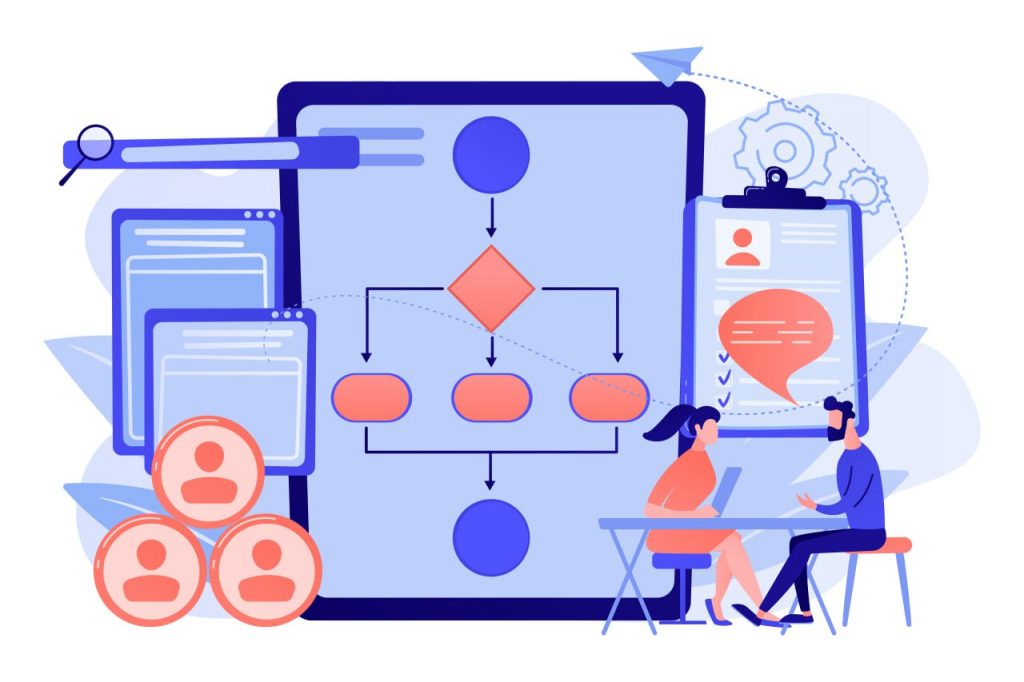
What do In-House HRs do?
Behind the scenes of every successful company, you’ll find a dedicated team of Human Resources (HR) professionals. They play a…
Behind the scenes of every successful company, you’ll find a dedicated team of Human Resources (HR) professionals. They play a pivotal role in ensuring the smooth functioning of the organization, from hiring the right talent to fostering a positive work environment.
But what exactly does an HR professional do? Their responsibilities are wide-ranging, encompassing everything from recruitment and onboarding to employee relations and benefits administration. They act as the company’s HR experts, advising on policies, resolving disputes, and ensuring compliance with labor laws. We’ll explore the various roles and responsibilities of in-house HR professionals. We’ll delve into the specific tasks they perform, the challenges they face, and the skills they need to succeed. Whether you’re considering a career in HR or simply curious about what this vital department does, this article will provide valuable insights.
Human resources meaning
Human Resources (HR) is the strategic function within an organization that focuses on managing its most valuable asset: its people. HR professionals are responsible for a wide range of activities that contribute to the organization’s success. They attract, recruit, and select qualified candidates for open positions, foster positive employee-employer relationships, develop and administer competitive compensation and benefits packages, provide opportunities for employees to learn new skills and advance their careers, set performance expectations, provide feedback, evaluate employee performance, and ensure compliance with all relevant employment laws and regulations. By effectively managing their workforce, HR professionals can help organizations achieve their goals, increase productivity, improve employee satisfaction, and ultimately drive organizational success.
What does the human resource department do?
Recruit candidates: HR professionals play a crucial role in identifying and attracting qualified candidates for open positions within the organization. They utilize various channels, such as job boards, social media, and employee referrals, to reach out to potential candidates. Once candidates are identified, HR conducts thorough screening processes, including reviewing resumes and conducting interviews, to assess their qualifications and fit with the organization’s culture.
Hire employees: After a successful screening process, HR extends offers to the most qualified candidates. They ensure that all necessary paperwork is completed and that new hires are properly on boarded into the organization.
Safe work environment: HR professionals are responsible for creating and maintaining a safe and healthy work environment for all employees. This involves complying with workplace safety regulations, conducting safety training, and investigating accidents or incidents.
Process payroll: HR plays a critical role in ensuring that employees are paid accurately and on time. They calculate payroll, process deductions, and issue paychecks.
Update policies: HR is responsible for reviewing and updating HR policies and procedures to ensure they are current and aligned with the organization’s goals. This includes policies related to hiring, performance management, compensation, benefits, and employee relations.
Maintain employee records: HR maintains accurate and up-to-date employee records, including personnel files, timekeeping records, and benefit information. These records are essential for various HR functions, such as payroll processing, performance reviews, and legal compliance.
Benefit analysis: HR conducts regular analysis of employee benefits programs to ensure they are competitive, cost-effective, and meeting the needs of employees. This involves evaluating the effectiveness of benefits, identifying areas for improvement, and making recommendations for changes.
Operating bonus schemes: HR may also be responsible for developing and administering bonus schemes to reward employees for their performance and contributions to the organization. These schemes can be based on individual or team performance, and they can be a valuable tool for motivating employees and attracting top talent.
Compliance with labor laws: HR professionals must ensure that the organization is in compliance with all relevant employment laws and regulations. This includes staying up-to-date on changes in the law, conducting regular compliance audits, and taking corrective action as needed.
Assisting employees: HR professionals provide guidance and support to employees on a variety of HR-related matters, such as benefits enrollment, leave requests, and resolving workplace issues. They act as a resource for employees and help to create a positive and supportive work environment.
How does HR support employees?
Onboarding: HR plays a key role in welcoming new hires and ensuring that they have a smooth transition into the organization. This includes providing necessary information and resources, conducting orientation sessions, and assigning mentors to help new employees acclimate to the company culture. HR may also organize social events or team-building activities to help new hires connect with their colleagues and feel a sense of belonging.
Providing career growth opportunities: HR is committed to helping employees develop their skills and advance their careers. This involves identifying employees’ career goals, providing opportunities for professional development, and offering mentorship programs. HR also works with managers to ensure that employees have clear career paths and receive regular feedback on their performance. By investing in employee development, HR helps to improve employee satisfaction, motivation, and retention.
Offering continuing education: HR supports employees’ professional development by offering continuing education opportunities, such as workshops, conferences, and online courses. These programs help employees stay up-to-date on industry trends and develop new skills. By providing access to continuing education, HR demonstrates its commitment to employee growth and development.
Training and supporting managers: HR plays a crucial role in training and supporting managers to be effective leaders. This includes providing training on topics such as performance management, coaching, and conflict resolution. HR also works with managers to address employee concerns and provide guidance on best practices for managing teams. By equipping managers with the necessary skills and resources, HR helps to create a positive and supportive work environment for all employees.
Promoting health and wellness: HR understands the importance of employee health and well-being. They offer a variety of health and wellness programs, such as wellness initiatives, employee assistance programs (EAPs), and health insurance benefits. These programs help employees to maintain their physical and mental health and improve their overall well-being. By investing in employee health and wellness, HR can reduce absenteeism, improve productivity, and create a more positive work environment.

HR Career Opportunities
At Recruiting.by, we specialize in connecting top HR talent with diverse career opportunities across various industries. Our expertise in the human resources field allows us to understand and match the unique requirements of both employers and job seekers. Here are some key HR roles we frequently place:
- HR Coordinator: Often an entry point into the field, this role focuses on administrative tasks such as maintaining personnel records, assisting with recruitment processes, and addressing basic employee inquiries. It’s an excellent opportunity to gain broad exposure to HR functions.
- HR Generalist: These versatile professionals handle a wide range of HR responsibilities, from recruitment and onboarding to employee relations and policy implementation. HR Generalists often serve as the primary point of contact for employees on HR-related matters.
- HR Specialist: We place specialists in various HR niches, including talent acquisition, compensation and benefits, learning and development, and employee engagement. These roles require in-depth expertise in specific HR areas.
- HR Manager: Leadership roles where professionals oversee HR teams and develop strategies aligned with organizational goals. HR Managers play a crucial role in shaping company culture and driving employee performance.
- HR Business Partner: A strategic position involving close collaboration with business leaders to align HR initiatives with company objectives. HR Business Partners provide valuable insights on workforce management and organizational development.
Each HR role contributes uniquely to an organization’s success. Whether you’re embarking on your HR career or seeking to advance to a senior position, we’re committed to helping you find the right opportunity that matches your skills, experience, and career aspirations in this dynamic field.
Skills to work in human resources
To work in human resources, you need a combination of hard and soft skills.
Hard skills are the technical skills that you can learn and measure. Some of the hard skills that are important for HR professionals include:
- Employment law: HR professionals need to have a good understanding of employment law to ensure that their organization is in compliance with all relevant regulations.
- Human resources information systems (HRIS): HR professionals often use HRIS software to manage employee data and automate HR processes.
- Recruitment and selection: HR professionals need to be able to effectively recruit and select candidates for open positions.
- Performance management: HR professionals need to be able to set performance expectations, provide feedback, and evaluate employee performance.
- Compensation and benefits: HR professionals need to be able to develop and administer competitive compensation and benefits packages.
- Training and development: HR professionals need to be able to identify training needs, develop and deliver training programs, and evaluate training effectiveness.
Soft skills are the personal qualities that you bring to your work. Some of the soft skills that are important for HR professionals include:
- Communication: HR professionals need to be able to communicate effectively with people from all walks of life. They need to be able to listen, understand, and respond appropriately to the needs of employees, managers, and other stakeholders.
- Problem-solving: HR professionals often need to solve complex problems, such as resolving disputes between employees or addressing workplace safety issues.
- Interpersonal skills: HR professionals need to be able to build and maintain relationships with employees, managers, and other stakeholders. They need to be able to work effectively in teams and collaborate with others.
- Negotiation: HR professionals often need to negotiate with employees, managers, and other stakeholders. They need to be able to reach mutually beneficial agreements.
- Ethics: HR professionals need to be ethical and have a strong sense of integrity. They need to be able to act in the best interests of the organization and its employees.
In addition to these hard and soft skills, HR professionals also need to be able to adapt to change and be willing to learn new things. The field of HR is constantly evolving, and HR professionals need to stay up-to-date on the latest trends and best practices.
HR Outsourcing
In today’s fast-paced business environment, organizations are increasingly turning to HR outsourcing to streamline their operations and focus on core competencies. By delegating time-consuming administrative tasks to external experts, HR departments can free up valuable resources to implement more strategic initiatives that drive business growth.
Common HR functions that are often outsourced include:
- Payroll administration: Ensuring accurate and timely payroll processing and compliance with tax regulations.
- Employee benefits: Managing employee benefits programs, such as health insurance, retirement plans, and time off.
- Recruitment: Handling the entire recruitment process, from job posting and candidate sourcing to interviewing and onboarding.
- Background checks: Conducting thorough background checks on new hires to verify employment history and identify potential risks.
- Exit interviews: Gathering feedback from departing employees to identify areas for improvement and reduce turnover.
- Risk management: Developing and implementing strategies to mitigate HR-related risks, such as workplace accidents or legal disputes.
- Dispute resolution: Investigating and resolving employee complaints and disputes.
- Safety inspection: Conducting regular safety inspections to ensure compliance with workplace safety regulations.
- Office policies: Developing and maintaining company policies related to HR matters, such as employee conduct, time off, and performance management.
By outsourcing these functions, organizations can benefit from increased efficiency, cost savings, and access to specialized expertise. Additionally, the use of modern HR technology can further streamline processes and improve overall HR performance. This allows HR departments to focus on more strategic initiatives that directly contribute to the organization’s success.
Conclusion
In today’s competitive business landscape, having a strong HR department is essential for success. HR professionals play a vital role in attracting and retaining top talent, fostering a positive work environment, and ensuring compliance with employment laws. By partnering with a reputable HR firm, organizations can access the expertise and resources needed to effectively manage their workforce and achieve their strategic goals.
At recruiting.by, we are committed to providing exceptional HR services to businesses in Belarus. Our team of experienced HR professionals has a deep understanding of the local labor market and can help you find and manage the best talent for your organization. Contact us today to learn more about how we can support your HR needs.
Our Blog
The latest news in our blog
A Complete Guide to Job Classification
The IT sector continues to develop actively, and with it, the diversity of positions, roles, and specializations within companies grows….
Brief Overview of Labor Legislation in Belarus
Belarus remains an attractive point on the map for international IT companies due to its strong engineering school, competitive hiring…
How EOR Simplifies Payroll and Tax Management in Belarus
Belarus remains one of the most attractive markets in Eastern Europe for hiring IT and digital professionals. Companies from the…
Contact
We’re available for the new projects



